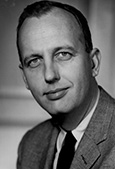Lucius Durham Battle
(1918-2008)

Class of 1946
Served as Naval Officer during World War II in the Pacific; reorganized the State Department as top assistant to Secretaries of State Dean Acheson and Dean Rusk. Served as Ambassador to Egypt (1964 – 1967) and twice as Assistant Secretary of State; founding Chairman of the Foreign Policy Institute at the Johns Hopkins School of Advanced International Studies (1980) and Chairman of the National Council on U.S.-Arab Relations (1995-2008).
Luke Battle “had nerves of steel, a sense of purpose and a Southern accent,” Secretary of State Dean Acheson said of his “indispensable aide.” The Dawson, Ga.-native grew up in Bradenton, Fla., where his father owned a hardware store. Battle earned his undergraduate degree from the University of Florida and joined the Navy where he served in the Pacific Theater during World War II. He earned his degree from UF Law in 1946 and in 1949 he married Betty Davis. By then, Battle had embarked on a career in the Foreign Service at the height of the Cold War.
Battle went to work in the State Department in 1946, helping administer the Marshall Plan, the American aid program to rebuild Europe immediately after the war. Battle was at the heart of U.S. government diplomacy as top assistant to Acheson and later Secretary of State Dean Rusk. He reorganized State Department operations in the 1960s and was a key figure in Middle Eastern diplomacy, chosen by President Lyndon B. Johnson as ambassador to Egypt and as assistant secretary of state for Near Eastern and South Asian Affairs.
After a stint as vice president of the Colonial Williamsburg project in Virginia, Battle rejoined the State Department in 1961 and was assigned the task of shaking up the agency. President John F. Kennedy was said to be unhappy with the State Department’s lack of urgency, and its attachment to tradition. Rusk assigned Battle to the job, and he developed a 24-hour monitoring system to track global events and relay crises to top government officials. From 1962 to 1964, Battle served as assistant secretary of state for culture and education.
Battle served as ambassador to Egypt from 1964 to 1967. At the time, Egypt was known as the United Arab Republic under the military dictatorship of Gamal Abdel Nasser Egypt, who was allied with the Soviet Union. When the American embassy was nearly burned down and partially looted by anti-American protesters Battle was on the scene fighting the fire with embassy Marines. A Washington Post obituary reported that in a formal protest to the Egyptian government, Battle complained that he arrived before firefighters even though he lived a quarter-mile away and the firehouse was 200 yards from the embassy. Battle arranged a 1966 tour of the United States by Anwar Sadat, a top general and aide to Nasser. Sadat succeeded Nasser as president of Egypt, and he tilted the nation’s policies toward U.S. interests and signed a peace treaty with Israel.
Battle left the government in 1968 to become vice president of the Communication Satellite Corporation. He remained active in Middle Eastern affairs as founding chairman of the Foreign Policy Institute at the Johns Hopkins School of Advanced International Studies in 1980 and by serving as chairman of the National Council on U.S.-Arab Relations from 1995 through 2008.
